Greetings, dabbers, and welcome to another weekly feature here at Dab Connection! Every Monday, we’ll be rounding up news stories about cannabis law, mostly in the US. Join us for this exciting time in history, the gradual end of pot prohibition, and keep track of this rapidly evolving field.
This just in…
Illinois, Michigan, and Vermont Next To See Recreational Cannabis Kick In
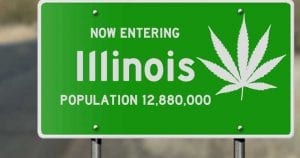
Ah, the promise of a new frontier for the cannabis market! While the west coast of the United States has lucked out with full legalization, the rest of the country has been feeling pretty dry… But this January 1st, the states of Illinois, Michigan, and Vermont are on track for new laws to kick in, making cannabis 100% legal for recreational use there.
Vermont isn’t as ground-breaking since neighboring Maine and Massachusetts have already been legal for a while. The real dramatic shift will be in the Midwest. Progressive attitudes are more common on both the “left coast” and Yankee New England, it’s been the flyover country that’s mostly been holding out. It will be interesting to see how this develops because this is also the prime agricultural country.
State by state: Illinois dispensaries are unsure how ready they’ll be to open their doors to business come January 1st. Michigan, which hasn’t quite implemented legal sales yet, is still not settled on how cannabis will be regulated in the state. And Vermont rounds out the three monkeys of confusion by saying they don’t know how they’re going to implement legal sales either.
All three states have just less than four months left to get ready for 2020. The countdown to New Year has begun…
We’re Talking About Cannabis Industry Antitrust Already?

It seems that we’ve barely glimpsed the dawn of the cannabis industry in the US, and already we have to talk about antitrust law in the context of canna-business. Once again, this is a symptom of a new industry. Hadley Ford, CEO of iAnthus Capital Holdings Inc., points out that more established industries like plastics have years of established practice to fall back on. But when cannabis businesses want permission from the Department of Justice to merge, they have no former record to go on.
For those who need catching up, antitrust is the American legal policy that tries to prevent monopolies from taking over the economy. When one corporation becomes too big for the economy’s own good, the government looks at splitting it up or preventing it from getting bigger. Famous past antitrust cases have been AT&T, which was split up in the 1980s, and Microsoft, which was fined for antitrust violations in both the US and the EU.
It’s weird to hear antitrust talk in the canna-business sector though. The telecom and computer industries were going on for decades before the government stepped in on those two very obvious monopolies at the time. How can one grower/distributor be accused of monopolizing a product that can only be legally sold in a few states?
Just in case anybody isn’t keeping up, notoriously cannabis-hostile Jeff Sessions is no longer with the DoJ, so these antitrust musings have nothing to do with him.
“Get #weedwise,” Says the California Bureau of Cannabis Control

California has seen the biggest retail market yet for cannabis, with sales expected to reach $3.1 billion this year. With that great power as the nation’s leading legalized cannabis market, comes great responsibility in regulating it. California’s BCC has taken the step of launching a #weedwise awareness campaign.
The campaign hopes to reach out and educate consumers about the risks associated with cannabis purchased from unlicensed businesses. Even though this campaign launched before several deaths related to vaping bunk cartridges, it’s an aptly timed initiative. Consumers have already gone from not really caring where their THC comes from to being sharply concerned.
The SF Chronicle has gone so far as to call on Federal authorities to follow suit. Says the opinion column there:
> “Thus, while California gets #weedwise, outdated federal laws that continue to designate cannabis in the Controlled Substances Act effectively encourage growth of the black market by ensuring state-legal businesses cannot compete with it.”
We couldn’t say it better ourselves.
A Look Back At The Town That Pot Bought
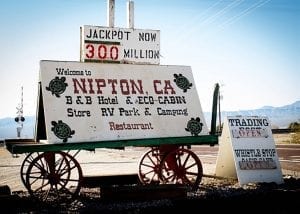
When we last left the sleepy Mojave Desert hamlet of Nipton, California, the entire 120-acre town had been bought, locked, stock, and barrel. The purchaser was American Green Inc., which paid $5 million with the hopes to turn it into “the country’s first energy-independent, cannabis-friendly hospitality destination.” That sounds so cozy!
So what’s happening in Nipton since? This motorcycle travel blog is the latest to visit Nipton, with a narrative not quite worthy of Hunter S. Thompson. In fact, the author seems to be downright unaware of the cannabis news and the only “weed” mentioned is of the tumbled variety.
What was the news before that? Back in October 2018, it was a stampede on the town for lottery tickets. This happens frequently with border towns in the western states, where it’s the closest point to participate in another state’s lottery. Still, not related to cannabis.
It’s almost as if a cannabis company owning a town doesn’t change anything at all. Plans to convert it into a pot-tourism destination may have been put off once Nevada kicked up tourism prospects on its side of the border.
Til next time, dab fans!


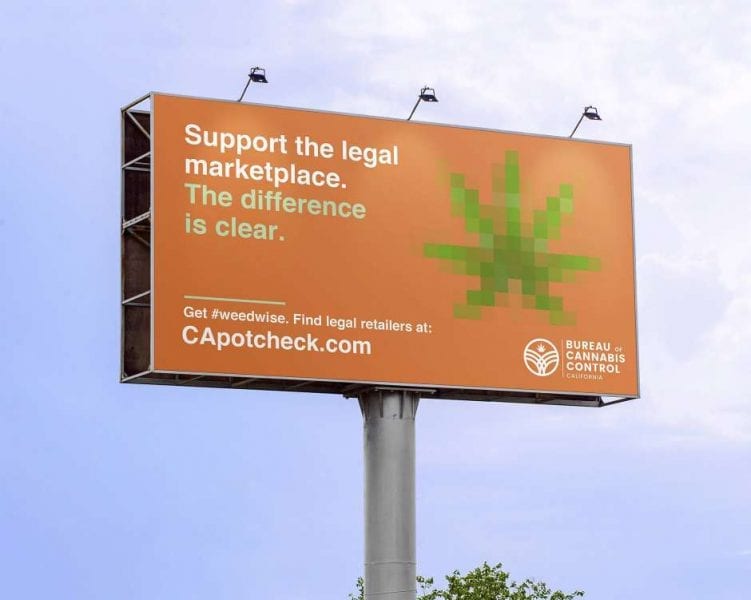


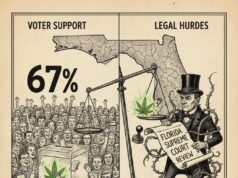


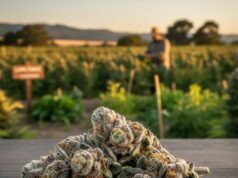





Appreciate the effort put into this. It’s always good to see quality content.
Hi there to all, for the reason that I am genuinely keen of reading this website’s post to be updated on a regular basis. It carries pleasant stuff.
I just like the helpful information you provide in your articles
Nice post. I learn something totally new and challenging on websites
This is my first time pay a quick visit at here and i am really happy to read everthing at one place
There is definately a lot to find out about this subject. I like all the points you made
Hi there to all, for the reason that I am genuinely keen of reading this website’s post to be updated on a regular basis. It carries pleasant stuff.
naturally like your web site however you need to take a look at the spelling on several of your posts. A number of them are rife with spelling problems and I find it very bothersome to tell the truth on the other hand I will surely come again again.
Great information shared.. really enjoyed reading this post thank you author for sharing this post .. appreciated
I’m often to blogging and i really appreciate your content. The article has actually peaks my interest. I’m going to bookmark your web site and maintain checking for brand spanking new information.
Nice post. I learn something totally new and challenging on websites
There is definately a lot to find out about this subject. I like all the points you made
naturally like your web site however you need to take a look at the spelling on several of your posts. A number of them are rife with spelling problems and I find it very bothersome to tell the truth on the other hand I will surely come again again.
This is my first time pay a quick visit at here and i am really happy to read everthing at one place
I’ve been exploring terpene-based products cdt terpenes recently, and I’m remarkably enjoying the experience. The scents are well off, customary, and pleasant. They annex a gracious drink to my day after day programmed, ration beat up a compare the mood and atmosphere. A great catch sight of after anyone who appreciates aromatic wellness tools.
I truly appreciate your technique of writing a blog. I added it to my bookmark site list and will
I truly appreciate your technique of writing a blog. I added it to my bookmark site list and will
I appreciate you sharing this blog post. Thanks Again. Cool.
naturally like your web site however you need to take a look at the spelling on several of your posts. A number of them are rife with spelling problems and I find it very bothersome to tell the truth on the other hand I will surely come again again.
Great information shared.. really enjoyed reading this post thank you author for sharing this post .. appreciated
I am truly thankful to the owner of this web site who has shared this fantastic piece of writing at at this place.
Pretty! This has been a really wonderful post. Many thanks for providing these details.
I appreciate you sharing this blog post. Thanks Again. Cool.
This was beautiful Admin. Thank you for your reflections.
หากคุณกำลังมองหาเว็บเดิมพันที่ให้มากกว่าแค่การ “วางเงินแล้วลุ้นผล” UFABET คือคำตอบอย่างแท้จริง ด้วยจุดเด่นที่ได้รับการยอมรับจากผู้เล่นทั่วทั้งเอเชียว่าแตกต่างจากเว็บทั่วไปอย่างชัดเจน ทั้งในด้านมาตรฐานการให้บริการ ความปลอดภัย ความโปร่งใส และความเอาใจใส่ที่มีต่อสมาชิกในทุกขั้นตอน ไม่ว่าจะเป็นด้านระบบเกมที่ครบครัน ความสะดวกในการเข้าใช้งาน หรือคุณภาพของทีมงานหลังบ้านที่พร้อมให้บริการอย่างใกล้ชิดตลอด 24 ชั่วโมง สิ่งเหล่านี้เองที่ทำให้ จุดเด่น UFABET กลายเป็นเหตุผลหลักที่ผู้เล่นส่วนใหญ่ยังคงเลือกใช้บริการในระยะยาว
เป็นเว็บพนันที่ดีที่สุดเท่าที่เคยเจอมา แนะนำให้เพื่อน ๆ มาเล่นกันเยอะ ๆ เลย
เป็นเว็บพนันที่ดีที่สุดเท่าที่เคยเจอมา แนะนำให้เพื่อน ๆ มาเล่นกันเยอะ ๆ เลย
เกมหลากหลายและน่าตื่นเต้น ไม่เคยเบื่อเลยที่มีตัวเลือกให้เล่นมากมายขนาดนี้
สามารถเล่นได้ทุกที่ทุกเวลา ทั้งบนมือถือและคอมพิวเตอร์ สะดวกสุด ๆ
โปรโมชั่นและโบนัสจัดเต็ม คุ้มค่าทุกการลงทุน เล่นแล้วได้กำไรดีจริง ๆ
รับงานรื้อถอนบ้าน โรงงาน คลังสินค้า
สวนอรุณี สามารถเปลี่ยนพื้นที่เล็กๆ หรือพื้นที่ที่มีข้อจำกัดให้กลายเป็นมุมพักผ่อนที่น่าอภิรมย์ได้อย่างน่าทึ่ง
ความเป็นธรรมในการเล่นสูง รู้สึกปลอดภัยและมั่นใจในทุก ๆ เกมที่ลงเดิมพัน
สวนอรุณี มีทีมงานที่มีความเข้าใจในธรรมชาติและสามารถเนรมิตพื้นที่ธรรมดาให้กลายเป็นสวนในฝันได้อย่างเหลือเชื่อ
CBD products present a at the ready and enjoyable feeling to face the effects of this compound. These gummies fingers on in distinct flavors, potencies, and formulations, providing users with controlled dosing and long-lasting effects. Profuse consumers cherish them for the purpose relaxation, pain relief. In any way, it’s prominent to annihilate them responsibly, as effects may take longer to rebound in compared to smoking or vaping. Always make sure of dosage guidelines and ensure compliance with local laws up front purchasing or consuming.
I recently tried mood weed , and I’m in actuality impressed with the quality. The effects were mild, calming, and exactly what I was hoping for. The variety of options also allowed me to learn something flawless representing both relaxing evenings and rich days. Once commend in favour of anyone seeking great results!
I’ve recently started using indica vape , and they’ve exceeded my expectations. From Delta 8 products to HHC products, the benefits are undeniable. They cure restrict urgency, promote catnap, and all the same ease child aches. What I enjoyment most is that they’re standard and don’t leave me intuition numbed or off of it. The rank of hemp products makes a tremendous contrast, so I perpetually look benefit of trusted brands. Whether you’re new to hemp or au fait, these products are a game-changer in the service of whole wellness.